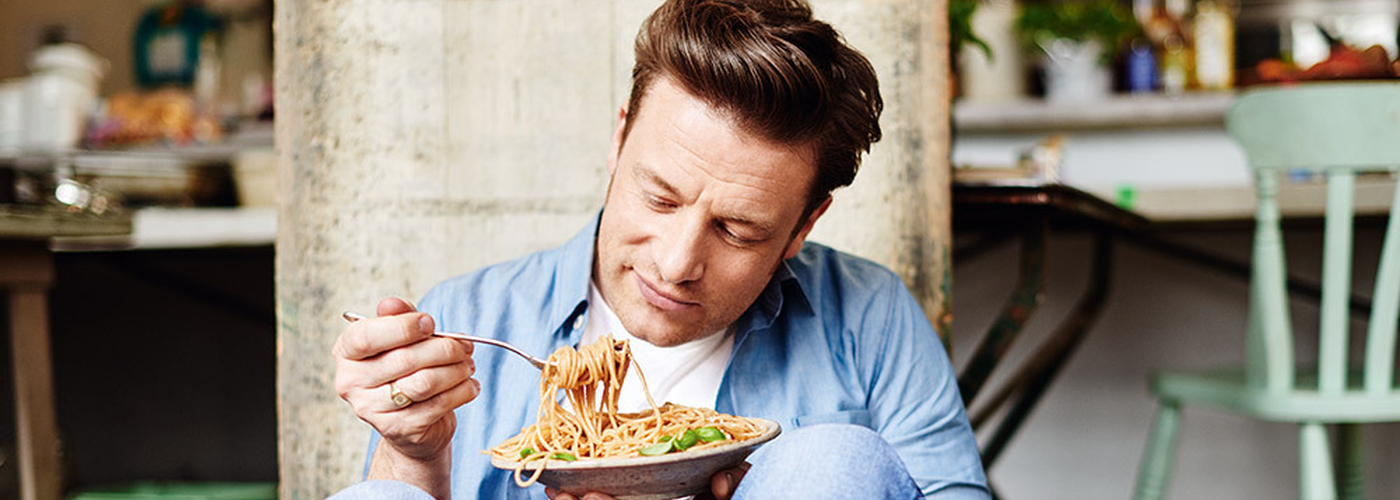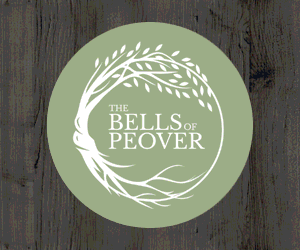We talk to the millionaire celebrity chef (and 'best mate' Gennaro Contaldo) about Italian nonnas, being poor and, of course, jerk rice
'Ask him about the jerk rice,’ over a dozen band wagon-jumpers said to me when they heard I was to interview Jamie Oliver. The Essex-born celebrity chef had hit the headlines after being accused of ‘cultural appropriation’ on Twitter by MP Dawn Butler for putting his name to a product called ‘punchy jerk rice’.
“When you do the kind of job I do, strange things come out of nowhere,” Jamie told us. “My whole career has been spent inspiring people to try new things and to make ingredients more accessible. So I kept quiet, because it was a bit daft.
“My whole vibe is about getting people into things to help start their own journey of food, no matter what country or culture it is. I know I’m good at it, because I’m here twenty years down the road. I’m an Essex boy shown on television in 220 countries, making the world a smaller place through food.”
They might not be around for much longer, so to make this show now was important
Jamie was in town with his mentor and ‘best friend’ Gennaro Contaldo, to promote their latest book and television series Jamie Cooks Italy; the culmination of a two-year project that saw them scour the lesser-known regions of Italy to uncover authentic Italian recipes cooked by nonnas (grandmothers).
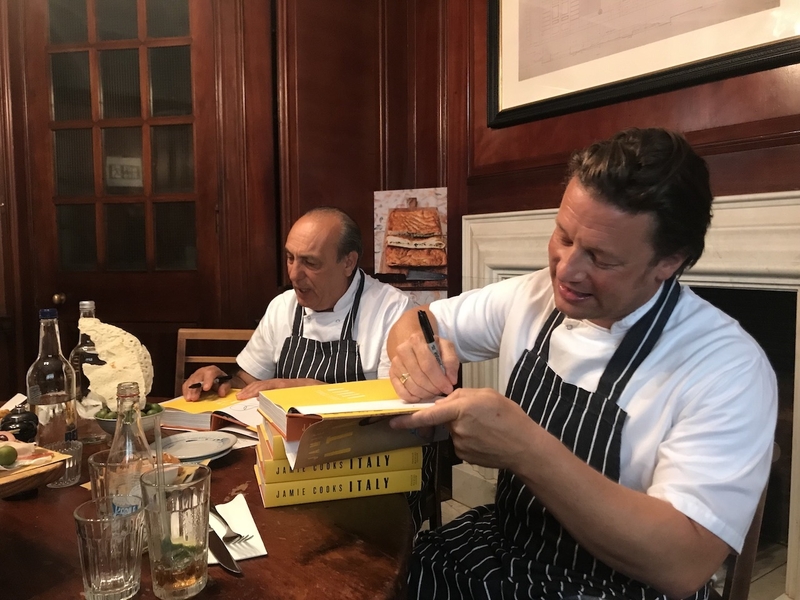
Oliver is well known for incorporating elements of social responsibility through his various food projects. So is this another?
“This is the last generation of proper old school nonna," he says. "80 and 90 year old women who grew up without electricity, without gas, without fridges or freezers, without a supermarket down the road. Cooks that learnt to cook at six or seven years old, over an open fire, for whole families while the rest of the family would be out working.
“The concept of being poor was completely different to how we judge it now, but that is actually what the planet really craves. A really frugal way of cooking, about nutrition, balance, whether it’s to do with waste, economy, budget, how you take a little and make it go a long way.
“Meeting a couple of nonnas is cute and interesting, but doing it on and off over many journeys, through summer and winter, from the mountains to the islands, this is also a respectful observation of how we treat people who reach a certain age. You get the longest living communities and you get the oldest recipes in the same parts of the world."
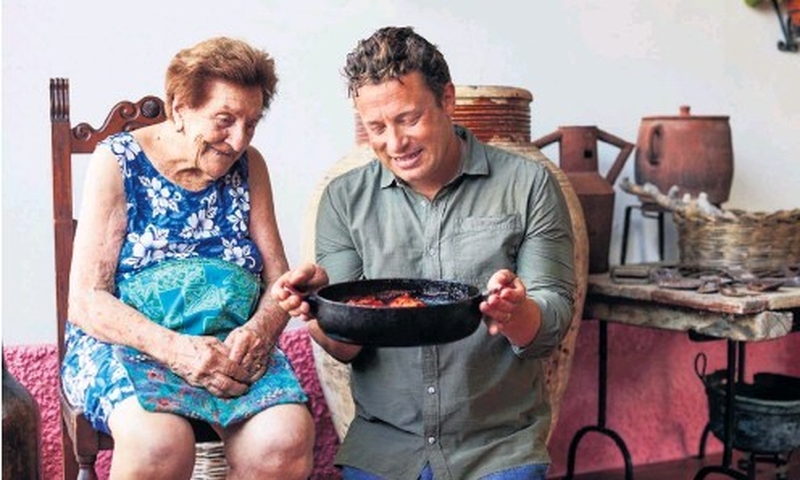
How did you go about finding these nonnas?
Jamie Oliver: "Britain is really good at documentary filmmaking. We have some brilliant Italian-speaking producers who spent months knocking on doors. We didn’t just Google Search it and end up with the same old, same old. People expect me to put extra resources into things and get under the skin. Hopefully when you see the show, you get that it has a bit of heart and soul, a bit of history and respect and joy and giggles.
Gennaro Contaldo: “When you reach that sort of age, you have a great life story. They told us so many stories about how they had to preserve food for the winter because if you didn’t do it, you would probably starve. It’s a simple as that. We met this Jewish nonna, my god, she told us this story of the second world war that left us trembling.”
JO: “They might not be around for much longer, so to make this show now was important. I know for a fact that there isn’t an Italian film crew going round capturing and archiving these things. It’s a national story.”
This is something that could translate across so many cultures, but for you, does it have to be Italy?
GC: “We have been talking about doing this project for about twenty years. This was an opportunity for me to show Jamie the Italy that I left fifty years ago before I came to England, because everything is changing.”
All food is an evolution; a tapestry of conflict, war, religion, poverty, celebration, festivals...
What has meeting the nonnas taught you?
JO: “To be grateful. I don’t mean this to be romantic, but when you hear what they went through with no modern facilities or medicine, throw in a couple of world wars, and the fact that some of them happen to be living in a brutal part of the country, sometimes at high altitude. Without being too dramatic, all of them were grateful for every little thing they were given to cook with.
“40% of the food waste in Britain happens in the home, but over there, it just wouldn’t happen. One of the biggest things wasted is bread. You’ve never seen so many incredible Italian recipes for bread soups, bread sauces and bread desserts. Turn it into something even better; a few crispy leaves, or a simple pasta dish with pane frittata that are like little fried breadcrumbs with herbs, scattered on it.”
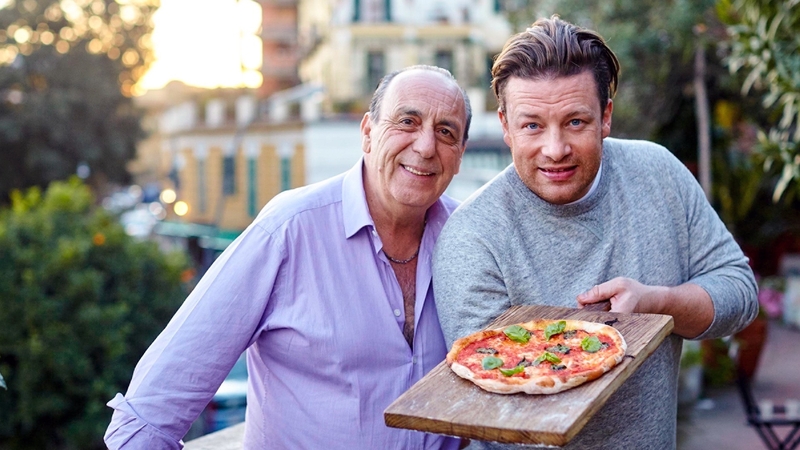
JO: “The Italians called it ‘cucina povera’ – poor people’s cooking, but they’re only just coming to terms with it because it was a disgrace - a question of survival.
“It was completely uncheffy. We almost learnt to uncook, which seems weird, but as a chef, it’s all about accuracy. All food is an evolution; a tapestry of conflict, war, religion, poverty, celebration, festivals, everything you can imagine. So they’re using the ‘wrong’ knife, to cut the ‘wrong’ way, but then it cooks irregularly, so you get a depth of flavour that’s not like a chef. The nonna’s brutal, crude way of prepping things is exactly what people did, and their food was incredible – although I wouldn’t ever endorse cutting towards you, or I might get sued.
“We absolutely didn’t mean for it to hit points, but it did resonate with current issues whether gender pay gap, the importance of women in society, waste, impact on the planet, and being able to cook and eat like a king with not much budget. So lots of relevant things were touched on.”
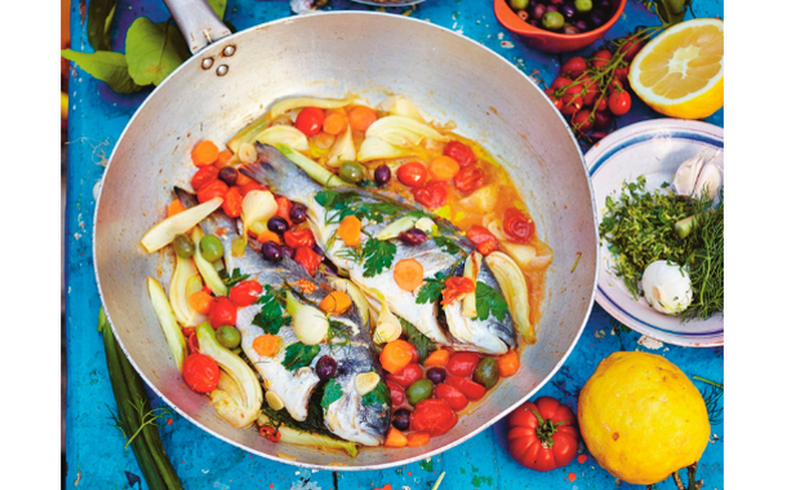
What’s the seed of your particular success?
JO: "My timing was perfect, because in the 90s Britain was changing. It was like, ‘if that little shite can do it, why can’t you? You’re like thirty years older than him and you ain’t pulled your finger out for months.’ The Naked Chef was born through women going to work and men around Britain looking at their missus after a twelve hour day going ‘what’s for dinner?’ And they weren’t having it. So I saw my audience change because as soon as men started to see you not as a threat, but as an ally, then cooking wasn’t actually for girls, cooking gets you girls."
If someone gave you a magic wand, what would you wish for?
JO: “That every kid would leave school at sixteen knowing ten recipes to save their lives and knowing how to shop and budget, because this country will be in a happier, healthy place. Cooking is not a luxury; it’s a life skill. You ain’t going to die thirteen or fourteen years younger because you didn’t do your geography homework.”
Sausages, they’re not fucking British...
Have you brought any ideas back for your Jamie’s Italian restaurants?
JO: "We’re now able to take teams on trips to see the ingredients, like picking capers, to bring back here. On the new menu we have dishes like chicken from Salina, an island that’s been invaded many times, so you have ingredients that are not traditionally Italian like couscous, aubergines, pine nuts and cinnamon making it almost Persian with gentle layers of flavour and a kind of sweet and sour, what the Italians call agrodolce.
"There’s also Aqcua pazza - fish and vegetables, in a one pan, seven minute dish. The nonna we learnt that recipe from was a fisherwoman, a fishmonger and a cook and a mum. We also found this community in the high mountains of North Italy who make these teardrop dumplings, which we’re putting on next week’s menu. So it’s more than just food, there’s a story. We’ve included a little introduction to the dish on the menu and I hope people really like it."
Would this type of programme work with UK nanas?
JO: "Parts of the Mediterranean are still like a snapshot of another world. England is not short of amazing food stories but going back to the jerk thing, fish and chips ain’t British, that’s Jewish Portugese. Chicken tikka masala has had no place in Indian culture ever, that was just British colonial empire, move on. Sausages, they’re not fucking British, that’s from all the Saxons coming over with their incredible butchery and deli skills but this is nothing to be scared of, this is a joyful thing.
"It all makes up a patchwork quilt of all the time and skills. Everything has a story and a purpose, but what’s quite exciting is that some of the recipes we’ve now got probably weren’t ever going to be cooked any more."
You can watch episodes of Jamie Cooks Italy on All4 here, and buy the book (from £9.99) via Jamie's website here.




